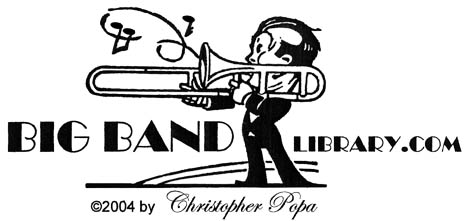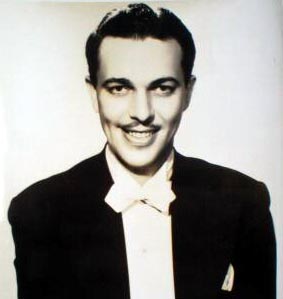
vital stats:
given name Truman Elliot Jenney
birth May 12, 1910, Mason City, IA
death Dec. 16, 1945, Los Angeles, CA, "complications related to appendicitis"
father John Jenney, a trumpeter and bandmaster
mother a concert pianist
brother Bob Jenney, a trombonist
brother George Jenney
first wife Kay Thompson, a singer-author, m.1937?, div.1940?, d.Jul. 2, 1998
second wife Bonnie Lake, a songwriter-vocalist, b.Mar. 10, 1916, m.1940?, d.Sept. 3, 1992
son John
education Cedar Rapids, IA; graduate, Culver Military Academy, Culver, IN
military service U.S. Navy, 1943-44
award member, Down Beat "All-American Swing Band," 1941
According to a newspaper report, Jenney started music lessons when he was 11, with his father as his instructor.
On trombone, Jenney's sound showed beauty and imagination, and he was hired by Isham Jones' orchestra in 1932, and for recording sessions by Red Norvo and Glenn Miller in 1935.
In 1938, Jenney started his own band, which, though it appeared at the World's Fair and Loew's State Theatre in New York City the following year, became only marginally successful.
They made just 19 recordings for Vocalion, between January 14, 1938 and January 30, 1940. The sides included Star Dust and What Is There to Say?, done October 19, 1939, and The World Is Waiting for the Sunrise and Cuban Boogie Woogie, cut December 6, 1939.
Besides his brother, Bob, who also played trombone, the members of Jenney's band included, at various points during those 24 months, Hugo Winterhalter and Steve Madrick, alto saxophones; Peanuts Hucko and Bunny Bardach, tenor saxophones; and Arnold Ross, piano.
Jenney was one of two trombonists (the other was Jack Teagarden) who played as part of the Metronome magazine all-star band, which recorded King Porter Stomp for Columbia on February 1, 1940.
By the summer of that year, Jenney had given up his band and accepted a position with Artie Shaw's orchestra. Among other tunes, he was featured on a new arrangement of Star Dust, recorded October 7, 1940 and which also gave space to Shaw and trumpeter Billy Butterfield. Jenney based his solo along the lines of the one he had done with his own group's record of Star Dust, but to even better effect and acclaim.
Shaw disbanded in the spring of 1941 but when he organized another large band that August, Jenney re-joined him.
After Shaw disbanded yet again in January 1942, Jenney and Butterfield played together on a single Decca recording session with vocalist Mildred Bailey, held the following month.
Jenney briefly worked with Benny Goodman's band around the end of 1942 and the start of 1943.
Following a stint with the Navy, Jenney settled in California to do studio work, but developed kidney trouble and died at an early age a short time later.
In remembrance of his accomplishments, a "Jack Jenney Music Festival" was held on June 9, 2001 in Dubuque, Iowa; additional fests took place annually at least through 2004.
sources:
D. Russell Connor, Benny Goodman: Listen to His Legacy (Metuchen, NJ: The Scarecrow
Press, Inc., 1988), pp.140-141.
Charles Delaunay, New Hot Discography: The Standard Directory of Recorded Jazz
(New York City: Criterion Music Corp., 1948).
Leonard Feather, "Jenney, Jack," in The Encyclopedia of Jazz (New York City: Horizon
Press, 1955), p.269.
"Jack Jenney Is Top Trombonist in 'Swing' Poll: Former Waterloo Boy Put in 'All-America'
Band," unidentified newspaper, Jan. 12, 1941.
"Jenney On Loew's State Bill," New York Times, Dec. 8, 1939.
Roger D. Kinkle, The Complete Encyclopedia of Popular Music and Jazz 1900-1950:
Volume 2 Biographies A Through K (New Rochelle, NY: Arlington House Publishers,
1974), p.927.
Brian Rust, "Jack Jenney and His Orchestra," in Jazz Records 1897-1942: A-Lym,
5th Revised and Enlarged Edition (Chigwell, Essex, England: Storyville Publications
and Co. Ltd., ), p.829.
Sidney M. Shallett, "President Invites Nations to Return to Fair Next Year; Women Veterans
of 1918 Entertained at the World's Fair," New York Times, Sept. 10, 1939, p.1.
George T. Simon, "The Horn-playing Leaders: Jack Jenney," in The Big Bands (New York
City: The Macmillan Company, 1967), p.471.
Sandye Voight, "Jenney Festival Filled with Jazz: Daylong Event: Eagle Point Park Is
Entirely Reserved," [ Dubuque, IA ] Telegraph Herald, May 31, 2001, p.c1.
---, "A new swing venue: Jack Jenney Music Festival plays 'guinea pig' in move to the
Alliant Amphitheater," [ Dubuque, IA ] Telegraph Herald, June 4, 2004, p.c9.
Leo Walker, "Jack Jenney," in The Big Band Almanac (Pasadena, CA: Ward Ritchie
Press, 1978), pp.211-213.
I would like to expand this tribute with, if possible, a new interview of someone who was important to Jack Jenney's life or career. Are you an alumnus of his band, a member of his family, or a collector who is knowledgeable about his accomplishments? Please contact me via e-mail
return to "Biographical Sketches" directory
go to Big Band Library homepage
The big bands are back
in a new and exciting way!
JACK JENNEY
"A SPRINKLE OF STAR DUST"
by Music Librarian CHRISTOPHER POPA
November 2008
He only led a big band only from 1938 to 1940, but he was a great trombonist whose playing and career were still being celebrated in his home state more than 60 years later.
Jazz critic and author Leonard Feather wrote that Jenney was known "for the quiet beauty of his tone and style on sweet melodic variations, of which Star Dust was the most extraordinary example."
Historian and author George T. Simon commented that Jenney "blew his instrument with great feeling, what for me is the warmest, most personal sound I've ever heard from any horn."

portrait by Murray Korman, ca.1939